If you’re looking for the most common affiliate marketing scams…
I’ve got your back!
Because in this post, I list 9 of the most common affiliate marketing scams in 2024.
Furthermore:
You’ll also learn how to avoid these scams, so you never become a victim.
Let’s check ’em out…
The Most Common Affiliate Marketing Scams
5: Click fraud
8: Fake leads
9: Pay-to-join affiliate programs
1: Get-Rich-Quick Schemes
You’ve likely seen or heard of these before.
Normally they’re flashy ads promising you’ll get rich quickly using some kind of “loop hole” or “secret system.”
And that you’ll get rich without having to do any work.
Get-rich-quick schemes prey on common human vulnerabilities, which is why people fall for them.
But always remember – if it sounds too good to be true, it probably is!
Here’s a few examples of get-rich-quick schemes to be aware of:
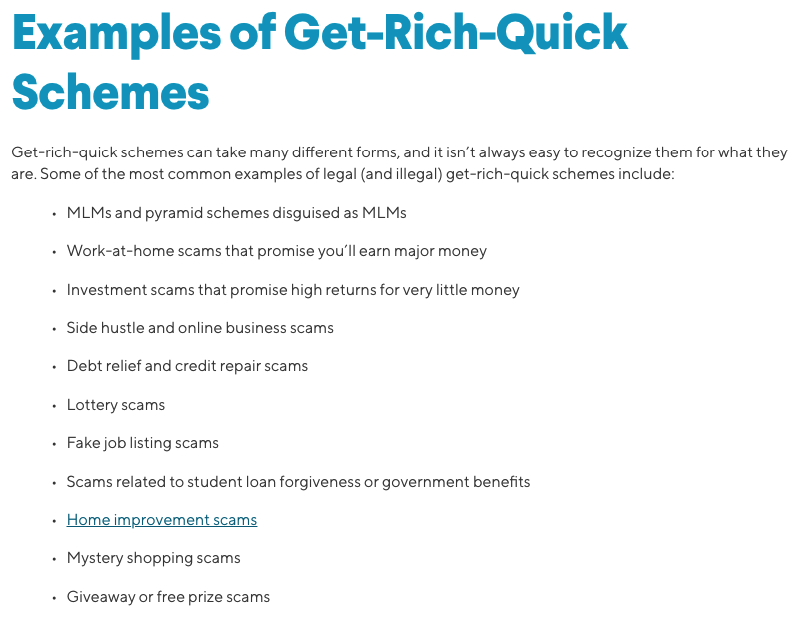
2: Cookie Stuffing
A cookie stuffing scam is where scammers use scripts to “stuff” affiliate cookies onto people’s browsers.
They do this without people knowing, or without people even clicking on their affiliate links.
If those people then purchase via the programs the scammers are targeting, the scammers are credited for the sales.
A well known case about cookie stuffing is that of Shawn Hogan – CEO and founder of DigitalPoint:

He was sentenced to federal prison when he was caught defrauding eBay of $28 million back in 2013/2014.
3: URL Hi-Jacking
Also known as typosquatting, this is a very common affiliate marketing scam that I’ve seen first hand. (From an affiliate of ClickFunnels.)
It’s where scammers will register a domain similar to the company they’re scamming.
If a visitor then types the wrong URL into their browser, they’ll be taken to the scammers site where the scammer then redirects them to the correct URL:
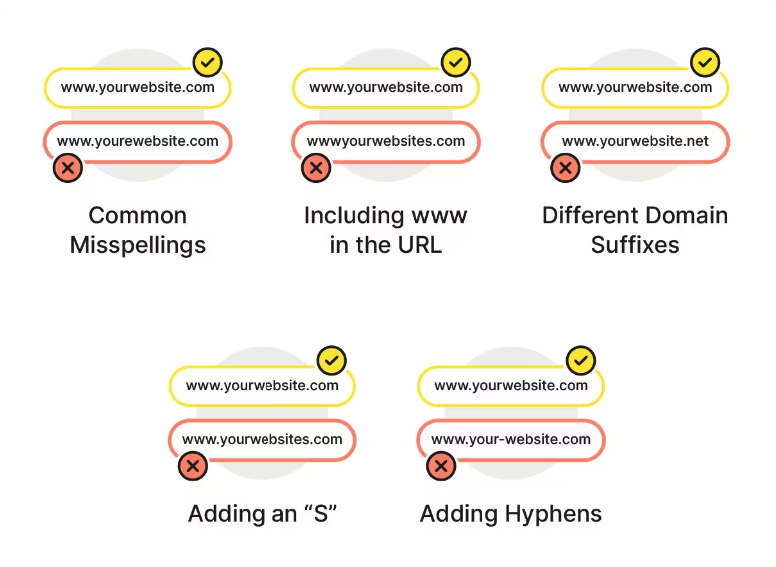
Of course, the scammers site is an affiliate link so they’re credited for sales they did not earn legitimately.
4: Fake Products
Fake product scams are exactly as it sounds – scammers promoting products and services that don’t actually exist.
Victims of this scam buy products that unfortunately, are never delivered.
Perform a background check on a website if you feel as though their products don’t seem legit.
And according to ScamWatch, always be wary of new stores you might see on social media that offer products at very low prices:
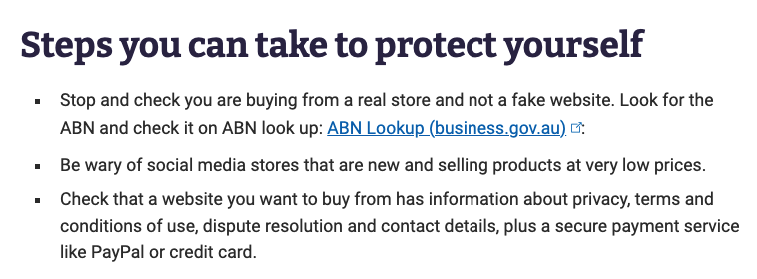
5: Click Fraud
Click fraud is where scammers use bots and malware to send fake traffic to PPC ads.
That traffic adds to the click count, when there was no real clicks to those ads.
Click fraud has cost some companies billions of dollars:
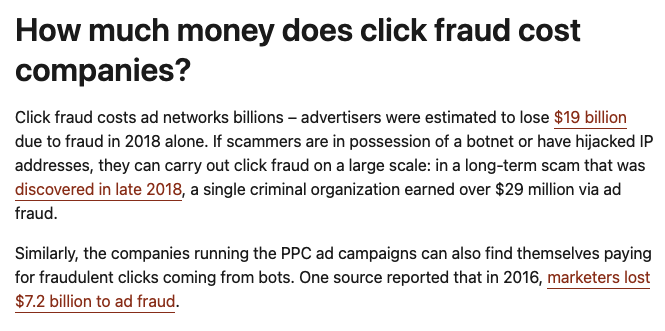
6: Transaction Fraud
This is a very popular affiliate marketing scam.
Transaction fraud is where scammers use stolen credit cards to make purchases via their own affiliate links.
Not only do they get the products they’ve stolen, but the commissions on the fraudulent sales as well.
7: Ad Hi-Jacking
Ad hi-jacking is where the scammer creates a landing page that looks like the site they’re targeting.
Then they run ads for branded keywords so they get the traffic, instead of the traffic going directly to the target site.
This is very deceptive and earns the scammer commissions on sales they should not get credit for.
According to SearchEngineLand, 75% of top brands fall victim to this scam:
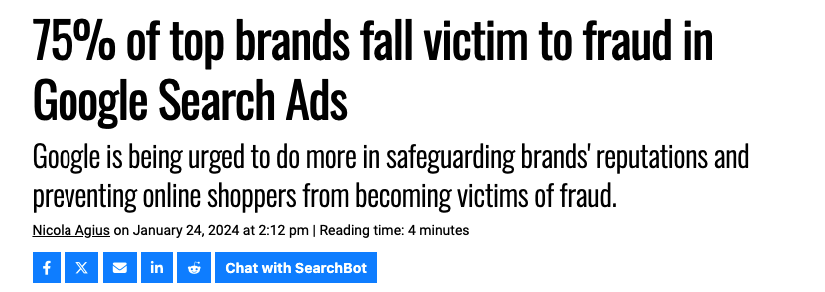
8: Fake Leads
This affiliate marketing scam is where scammers use bots to generate fake leads for a PPL (pay-per-lead) affiliate program.
With a PPL program, you’re paid anytime you generate leads for the company who’s running the program.
The scammer uses bots to fill out the required forms and thus, generates commissions on leads that are not from humans.
9: Pay-To-Join Affiliate Programs
This is another common affiliate marketing scam where you’re required to pay before you can join an affiliate program.
Most trusted affiliate programs are free to join, and never ask for any kind of payment.
If you ever come across an affiliate program asking for money before you can join, it’s most likely a scam.
How To Avoid Affiliate Marketing Scams
Research The Company
If you’re unsure about a particular company, do some research.
Use Google and social media to gain insights into the company.
Also, check out their terms and policies to make sure everything looks good.
A trusted company will be transparent and have all of their information available on their website.
Use Common Sense
If something sounds too good to be true, it probably is.
If you’re even slightly wary, steer clear of that company until you can vet their trustworthiness.
Affiliate Marketing Scam FAQs
Is Affiliate Marketing Legit?
Yes, affiliate marketing is legit.
That’s why 31% of publishers say affiliate marketing is their top revenue source.
How Do I Spot An Affiliate Marketing Scam?
Look for claims that are too good to be true.
Because if it sounds too good, it’s likely a scam.
How Common Are Affiliate Marketing Scams?
Very common.
Unfortunately, there will always be people looking for ways to scam their way to making money.
Is Affiliate Marketing Worth It?
Yes, affiliate marketing is worth it.
But it does require hard work and commitment to see any kind of success with it.
Recap Of The Most Common Affiliate Marketing Scams
1: Get-rich-quick schemes
2: Cookie stuffing
3: URL hi-jacking
4: Fake products
5: Click fraud
6: Transaction fraud
7: Ad hi-jacking
8: Fake leads
9: Pay-to-join affiliate programs
Conclusion
Well, there you have it.
9 common affiliate marketing scams that you need to be aware of.
Be sure to check out the best affiliate programs for beginners too.
And these affiliate marketing tips that could make you a fortune.
Now, over to you…
“Have you been a victim of any of these affiliate marketing scams?”
Let me know in the comments below.
I’d love to hear from you!




![How to Do Affiliate Marketing Without a Website [2024]](https://ahc-1cde4.kxcdn.com/wp-content/uploads/2020/05/How-to-do-affiliate-marketing-without-a-website-300x220.png)